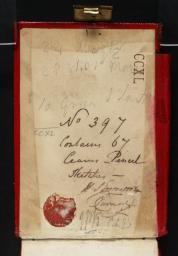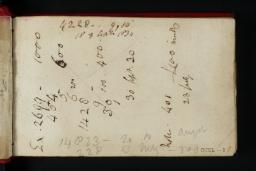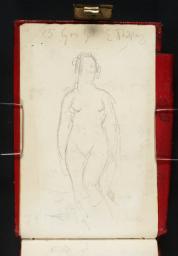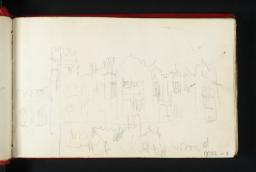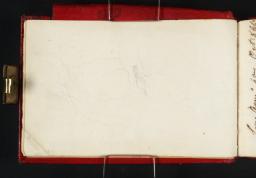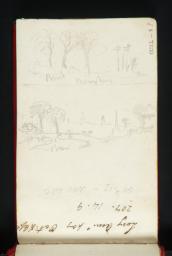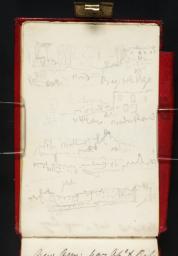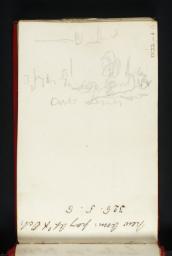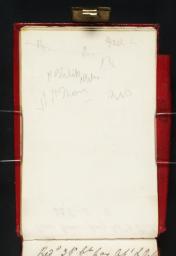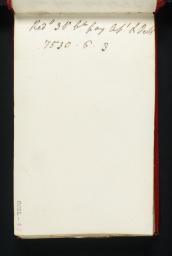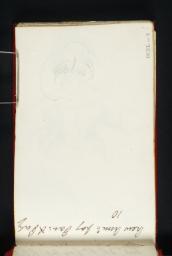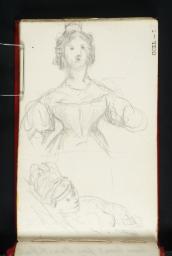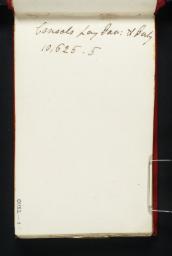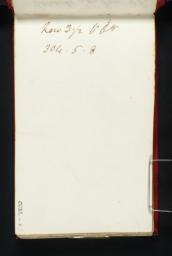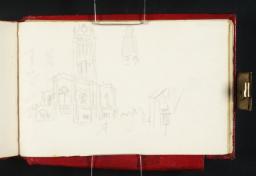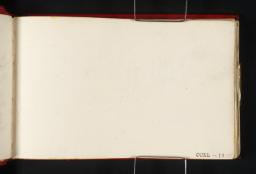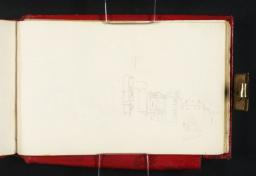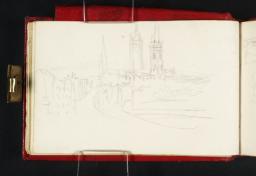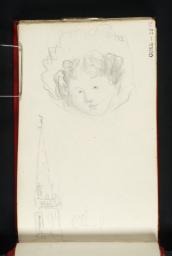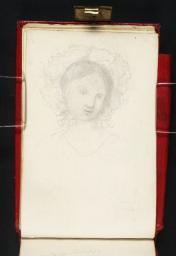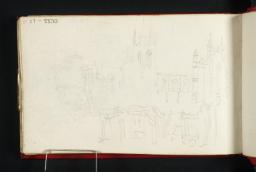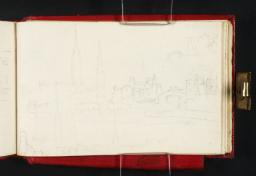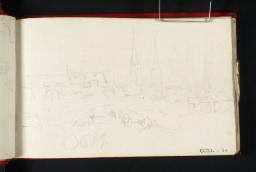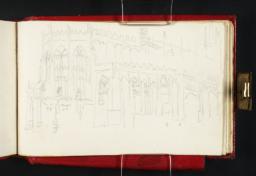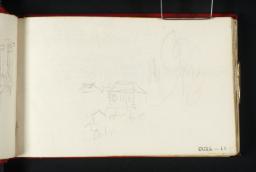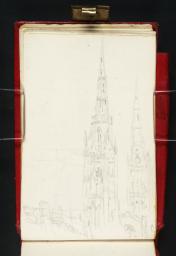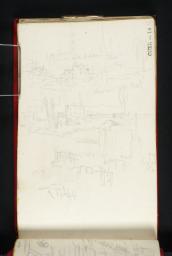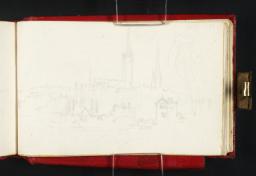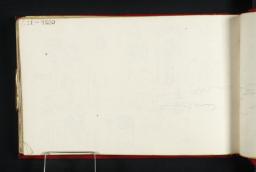Turner Bequest CCXL 1–72a
Sketchbook bound in boards, covered in red leather with blind-stamped ruled borders and a brass clasp
72 leaves and pastedowns of white wove paper with edges washed yellow; page size 68 x 110 mm
Probably made by John and Edward Gater, Up Mill, South Stoneham, Hampshire or William Gater, West End Mill, South Stoneham, and John Jones and John Mather, Afonwen Mill, Denbigh, North Wales; various sheets watermarked respectively ‘Gater | 1827’ and ‘[Prince of Wales feathers]’
Blind-stamped with Turner Bequest monogram front cover, towards top left
Stamped in black ‘CCXL’ front cover, top right
Numbered 397 as part of the Turner Schedule in 1854 and endorsed by the Executors of the Turner Bequest inside front cover (D41056)
72 leaves and pastedowns of white wove paper with edges washed yellow; page size 68 x 110 mm
Probably made by John and Edward Gater, Up Mill, South Stoneham, Hampshire or William Gater, West End Mill, South Stoneham, and John Jones and John Mather, Afonwen Mill, Denbigh, North Wales; various sheets watermarked respectively ‘Gater | 1827’ and ‘[Prince of Wales feathers]’
Blind-stamped with Turner Bequest monogram front cover, towards top left
Stamped in black ‘CCXL’ front cover, top right
Numbered 397 as part of the Turner Schedule in 1854 and endorsed by the Executors of the Turner Bequest inside front cover (D41056)
Accepted by the nation as part of the Turner Bequest 1856
Exhibition history
References
This is small sketchbook in one of two used in the late summer of 1830 on Turner’s tour of the English Midlands, in search particularly of fresh material for the series of watercolours showing Picturesque Views in England and Wales, published as engravings between 1827 and 1838. A.J. Finberg posited that two others, Kenilworth (Tate; Turner Bequest CCXXXVIII) and Worcester and Shrewsbury (Tate; Turner Bequest CCXXXIX), were used on this trip1 but, as explained in the overall Introduction to the 1830 tour, Worcester and Shrewsbury comprises a different itinerary, datable to 1831.
At the end of the book as foliated is a sequence of sketches along the River Thames between Hammersmith and Putney, including views of the bridges then at both locations. These may possibly date from 1827, when the suspension bridge at Hammersmith was under construction; see under folio 58 verso (D22434). Turner appears to have then set the sketchbook aside until 1830. As outlined in the Introduction to the tour, in terms of identified subjects the route may have been as follows, with the places in brackets confined to the concurrent Kenilworth sketchbook. In each case a key sketch is noted, under which the subject and further drawings are discussed:
[Oxfordshire: Oxford, Woodstock and Blenheim Palace]
Leicestershire: [Ashby-de-la-Zouch], Leicester (folio 25 recto; D22367)
Of these subjects, Birmingham, Coventry, Dudley (the most extensively covered), Lichfield, Tamworth and Leicester are common to both sketchbooks. As compared with several taken from the concurrent Kenilworth sketchbook,2 only one England and Wales subject derived exclusively from the present book: the watercolour Coventry, Warwickshire, of about 1832 (British Museum, London),3 engraved in 1833 (Tate T06105).4 Its sources were two double-page sketches, on folios 25 verso–26 recto (D22368, D22369), and 26 verso–27 recto (D22370, D22371). Another completed England and Wales-type watercolour was not engraved: the watercolour Lichfield, of about 1830–5 (private collection).5 There is a related sketchy on folio 33 verso (D22384); see also the Kenilworth sketchbook (Tate D22068; Turner Bequest CCXXXVIII 50a). See the tour Introduction for other Midlands watercolours of the period.
As Gerald Wilkinson has noted, the contents of this sketchbook are rather more miscellaneous that those of the Kenilworth book;6 there are several figure studies including nudes (see under folio 1 verso; D22324), and a series of financial notes (see under folio 1 recto; D22323). James Hamilton has observed that Birmingham and Coventry was ‘small enough to fit into the palm of [Turner’s] hand. The detail in these studies is spare, but there is an intensity of expression in the drawings of church spires and towers’ of Birmingham and Dudley, ‘and of the dirty and heavy industrial equipment lying about.’7 Finberg noted John Ruskin’s rather less enthusiastic endorsement on a wrapper, since lost: ‘Inv. 397. Nearly Valueless.’8
The author is particularly grateful for the assistance of Dr Bernard Richards (Emeritus Fellow, Brasenose College, Oxford), who fortuitously contacted Tate while the present tour was being catalogued. Dr Richards enthusiastically shared his unpublished Turner research, informed by local knowledge of Dudley and Birmingham subjects in particular,9 many of which have been identified or confirmed here with his help as noted in individual entries.
Finberg 1961, p.323; 1830 dating followed for all three sketchbooks by Wilton 1975, p.124, 1979, p.191 note 18, 1987, p.168, 2006, p.238.
For the series in general see W[illiam] G[eorge] Rawlinson, The Engraved Work of J.M.W. Turner, R.A., vol.I, London 1908, pp.xlvii–l, xciv–xcvi, 117–69 nos. 209–304; Wilton 1979, pp.391–403 nos.785–880, and ibid., pp.403–4 nos.881–895 for related designs; see also Eric Shanes, ‘England and Wales, Picturesque Views in’ in Evelyn Joll, Martin Butlin and Luke Herrmann (eds.), The Oxford Companion to J.M.W. Turner, Oxford 2001, pp.87–9.
Technical notes
How to cite
Matthew Imms, ‘Birmingham and Coventry Sketchbook principally 1830’, sketchbook, August 2013, in David Blayney Brown (ed.), J.M.W. Turner: Sketchbooks, Drawings and Watercolours, Tate Research Publication, September 2014, https://www

